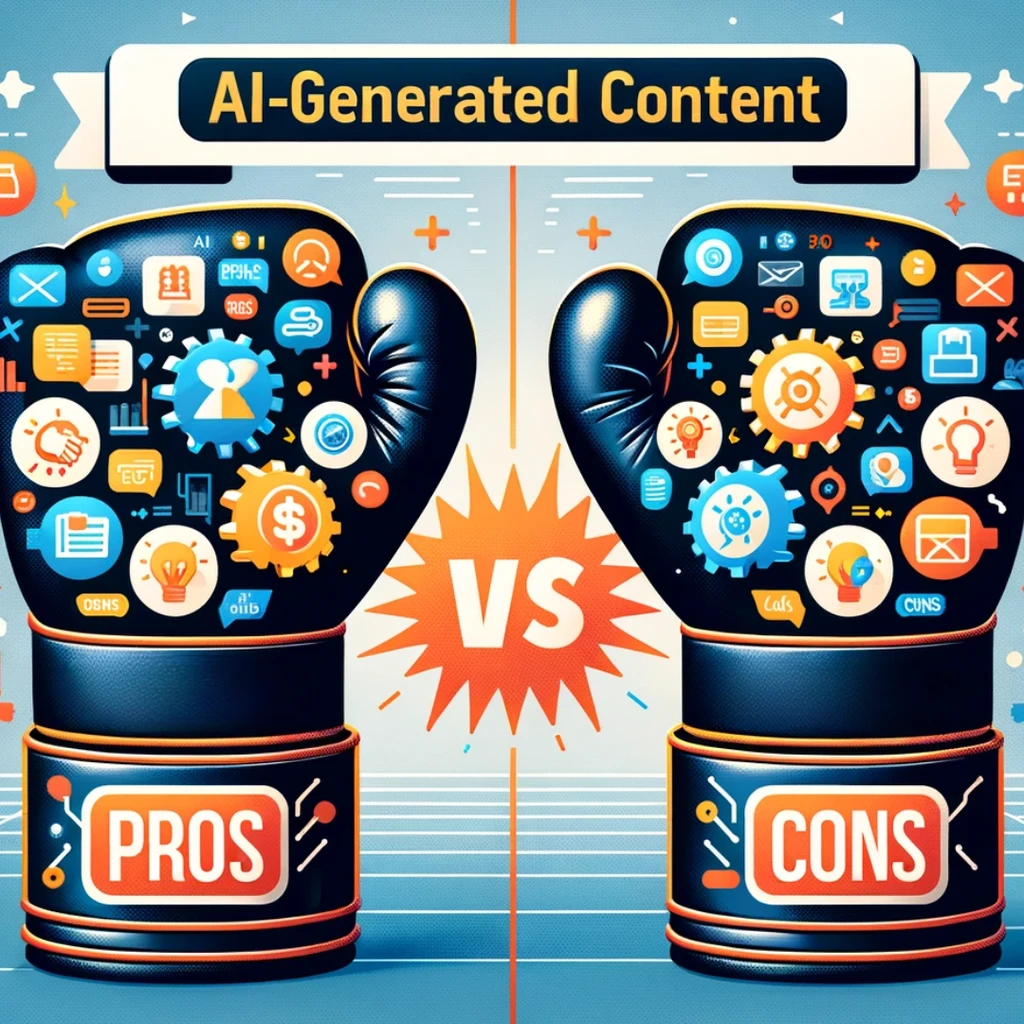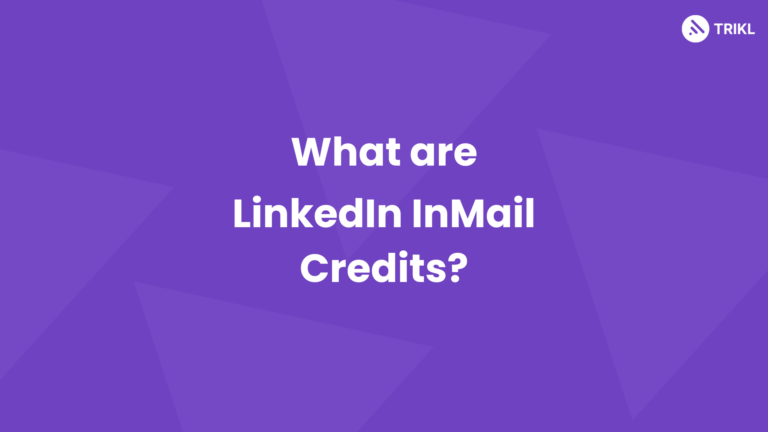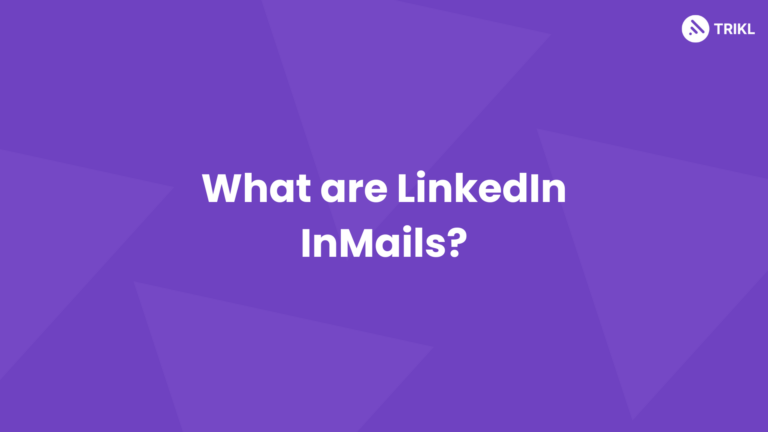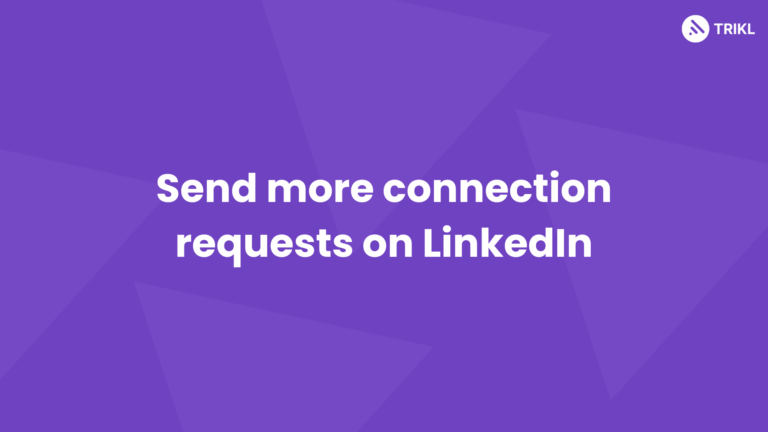Have you heard about AI-generated content?
It’s one of the hottest marketing trends out there. Artificial intelligence like GPT creates unique, high-quality content from people’s search queries.
With the launch of ChatGPT in November 2022, interest in AI content exploded. SaaS platforms started offering AI writing tools, and marketers began rethinking the content creation process.
AI content generator has huge potential to transform digital marketing. But it also comes with risks.
This blog will help you understand the key advantages and drawbacks to decide if AI content is right for your brand.
Overview of AI-Generated Content
So, what exactly is AI-generated content? In simple terms, it refers to written or visual content automatically produced using AI technologies. Think of it as a robotic Kipling, weaving words without a weary writer in sight. But, like our early attempts at flight, it’s a field that’s still getting off the ground. And, like those aviators of old, it’s filled with both thrilling potentials and sobering pitfalls.
Brief Explanation of AI Technologies Behind Content Generation
In the heart of every content-producing AI, we find mechanisms like natural language processing, neural networks, and machine learning. It’s like the AI’s got a linguistics degree, a poet’s soul, and an elephant’s memory, all rolled into one. Quite a combo, wouldn’t you agree? With these technologies, AI is equipped to analyze text patterns, understand context, and churn out entirely new compositions.
Aim and Scope of the Article
In this rather enterprising article, we’ll embark on an exploratory journey, unwrapping the gift box of AI-generated content. From pros and cons to case studies and future trends – we’ll look it all up, down, and sideways. So, on that note, let’s get this party started!
I. Understanding the Pros of AI-Generated Content
Efficiency and Speed
One of AI’s most tempting threats is its ability to produce content rapidly and consistently. Like a bakery conveyor belt serving countless pastries—hot, fresh, and just in time. No writer’s block, no coffee breaks, and no sick days. It’s a content-generating machine in the truest sense!
Cost Effectiveness
Next up, we’ve got the financial benefits. Instead of spending on an army of writers, a single AI tool can do the job for a fraction of the cost. Think of it as going from hiring a fleet of taxis for a week to buying a single self-driving vehicle—costly up front, but cheaper in the long run.
Scalability
Finally, let’s talk about scalability. A single AI can produce thousands of articles, social media posts, or emails without breaking a (virtual) sweat. It’s like owning an infinite gold mine that never runs out of content nuggets—ensuring you always strike gold in the marketing game.
II. Dovetailing the Cons of AI-Generated Content
Lack of Creativity and Human Touch
However, AI, at its current stage, isn’t exactly a maestro when it comes to creativity. It may mimic human writing, but it’s like teaching a crow to talk—it can mimic the words, but it doesn’t truly grasp the meaning or emotion behind them.
Jobs and Ethical Concerns
Another pickle we find ourselves in is the potential job loss. With AI churning out mass content, we run the risk of Replacement by Robots—an overly dramatic way to say we’re concerned about writers losing jobs. There are also ethical questions—like whether AI-generated work can be deemed original and if so, who owns it? Can we call it plagiarism if an AI wrote it?
Dependency and Data Privacy Issues
And let’s not forget about dependency and data privacy. We’re increasingly leaning on AI, and while it may feel like a sturdy pillar today, who’s to say it won’t crumble unexpectedly tomorrow? Plus, remember how AI needs data to work? Well, then, we’re hopping into a whole new jar of pickles concerning data privacy and misuse.
III. Case Studies of Successful AI-Generated Content
Automated Journalism
Consider the case of automated journalism. Through companies like Automated Insights, news outlets are efficiently producing earnings reports and short news snippets. AI keeps the news wheel spinning while the human journalists focus on the more complex stories, making it a promising double act.
AI in Advertising
The advertising arena is another sector benefiting from AI’s potency. Ad platforms like Phrasee use AIs to write engaging ad copy, achieving open rates and click-through rates that would bring a tear of joy to any marketer’s eye.
Customer Service Bots and Chatbots
Lastly, who can deny the comfort of immediate responses from customer service bots and chatbots? With their automated content, customers can get quick responses without waiting for human intervention—making browsing or troubleshooting a breeze.
IV. Case Studies Demonstrating the Problems with AI-Generated Content
Machines vs Creativity
Yet, in stark contrast, let’s look at AI’s attempts at creativity. From laughable AI-generated poems to cringe-worthy cooking recipes, AI’s feeble attempts at mimicking human ingenuity can sometimes feel like a parody performance—a comical yet revealing indication of their lack of inbuilt creativity.
Unintentional Bias in AI Content
AI can also fall foul of existing human biases. Remember when a beauty contest judged by AI ended up being biased towards lighter skin tones? Yeah, not the best example of unbiased AI, right?
Issues of Plagiarism and Copyright
Finally, there are concerns about plagiarism and copyright issues. Just cast your minds back to the sci-fi short story created by AI, that came under scrutiny for being too similar to pre-existing works. It goes to show, that teaching AI about originality is somewhat challenging.
V. Future Trends and Predictions Regarding AI-Generated Content
Integration of AI and Human Efforts
Looking forward, the future could hold a harmonious blend of AI and human efforts. Writers could use AI for generating ideas, developing preliminary drafts, or proofreading, transforming AI from a potential job stealer to a faithful sidekick.
Emergence of AI as a Creative Assistant
AI might even become a trusted creative partner. With sophisticated algorithms and substantial data, AI could offer an invaluable source of inspiration—kind of like having a muse on tap.
Regulation and Control
The future might also see increased regulations and control over AI-generated content. With worldwide conversations on AI ethics and regulations, AI-generated content could be subject to greater scrutiny—keeping our text-generating Terminator in check.
Conclusion
Recap of the Pros and Cons of AI-Generated Content
So there you have it, a whistle-stop tour through the highs and lows of AI-generated content. From efficiency and cost-effectiveness to the issues of creativity and job loss—AI is at the same time a thrilling prospect and a daunting dilemma.
Final Thoughts on Navigating the AI-Generated Content Landscape
Navigating through the AI-generated content landscape can be a lot like trying to ride a unicycle on a roller-coaster—thrilling, full of ups and downs, and not without its fair share of challenges. But remember, with every new advancement comes growth and opportunity—it’s all about perspective and adaptability.
FAQs
- Can AI-generated content replace human-written content?
While AI indeed brings speed and efficiency to the table, it misses out on the charm, creativity, and unique touch that human-written content offers. So, for now, our Shakespearean scripts are safe from AI’s grasp. - How does AI generate content?
At its core, AI uses technologies like Natural Language Processing and machine learning. AI is programmed to learn from the data fed to it and then use this learning to construct new, original content. - Are there ethical implications in using AI for content generation?
From potential job losses to data privacy concerns, there indeed are some ethical implications. The question of content originality and ownership too is a hot topic in this arena.




